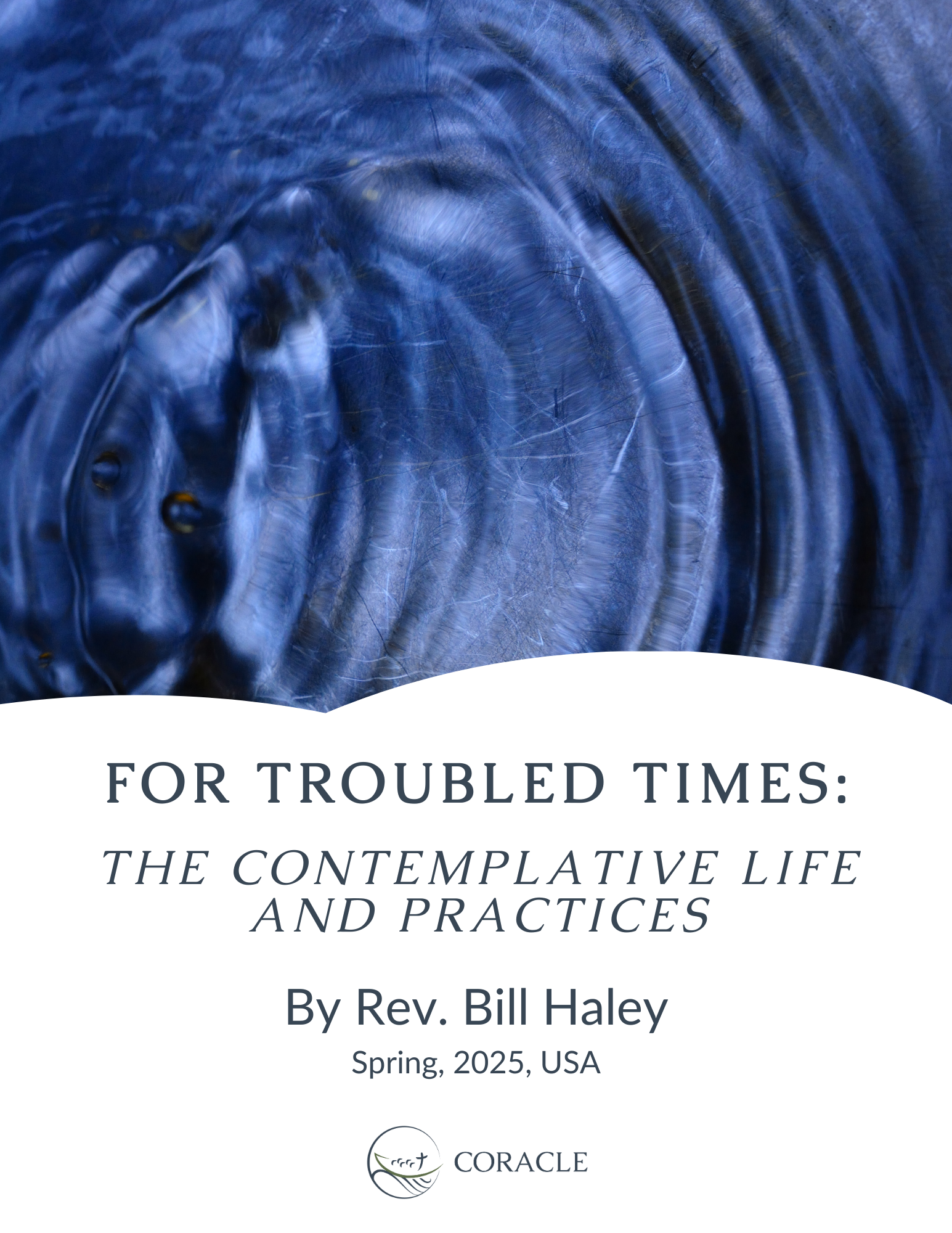Friends, I care about you, about your well being, your peaceableness, your deeper life in God, and each of our invitations to Christ-likeness, especially in this national moment in America. How might what we’re all going through be an agent of our personal deepening and even transformation? It’s been said by somebody, “Don’t let a good crisis go to waste”. So how might we find redemption in the many hard moments in this difficult season with more to come?
On a couple of occasions in recent months I’ve felt led to offer more of a pastoral word in this tumultuous season, and I’m feeling that unction again. I’m glad to be offering this reflection as promised as part of Coracle’s “Resilience, Response, and Rest” initiative.
A friend of mine recently said, “What I’d really like to know is how the contemplative life can give us help right now.” That felt deeply right and got me thinking.
Contemplation is “to be present to the loving presence of God”. You may wonder if you are a contemplative or want to move in that direction. Here’s something I offered last year that might help, along with a little more on what contemplation actually is. A contemplative approach to life, a contemplative posture, offers a lot of help in troubled times.
On a recent flight, these angles and actions came to mind. As opposed to bullets, I’ve listed them in no particular order as days, as practicing one a day seems more spacious, manageable, and longer lasting. Don’t feel like you need to follow the order given, you may want to survey the list and choose the one on a given day that seems to be an invitation to you. You may want to practice some of them more regularly and integrate them into your days. You may want to revisit one or more and practice it more regularly.
With a gentle spirit and a posture of invitation, I invite you to consider these things:
Day 1: Consider that God is all around us always, that God is very near to you, as near as breathing.
Day 2: Consider practicing Breath Prayers.
Day 3: Consider the fundamental orientation and commitment of a follower of Jesus is Love and to love. Consider the implications that our fundamental vocation as Christians and human beings doesn’t change. Reflect on what that is in your own words.
Day 4: Consider the insight of Teilhard de Chardin that all things, all creation, all history, are moving towards love. Even with developments that are destructive and disappointing, still in the big picture it all moves towards love.
Day 5: Consider that the battle between good and evil, darkness and light, is very real. Consider that good/God will prevail in time.
Day 6: Consider Jesus, how he modeled ‘cruciform’ love. Consider Jesus, how he died for this world, which was broken when he loved it at the cross and which he still loves. Consider how Jesus loves the world through you.
Day 7: Consider regularly receiving the Eucharist, at least once a week.
Day 8: Consider praying this regularly, with the sincerity that emerges from the conviction that you’re talking to somebody: “Lamb of God, who takes away the sins of the world, have mercy on us”, or “Lord, have mercy; Christ, have mercy; Lord, have mercy.”
Day 9: Consider how you can love those immediately around you, remembering Mother Teresa’s admonition, “Do small things with great love”. Consider how you can enjoy spreading love.
Day 10: Consider that the Earth is very old and history is very long. Empires, nations, and kingdoms rise, and then they fall, and others take their place. The global dominance of the United States of America will not last forever because it was never going to last forever.
Day 11: Consider listening for what is yours to do in this time, assume God has something for you and practice discernment. When you have a sense of maybe something, invite others into your idea for their sense about it. If it clarifies, deepens, and remains as something that you think is being given to you to do…then do it. Contemplation is not exclusive from action, in fact the two must stay intimately connected.
Day 12: Consider looking conscientiously to nature to see how creation might speak. What does nature have to say to you about the times we’re living in?
Day 13: Consider learning from certain mystics whose lives were marked by living through horrible times, like Etty Hillesum or Simone Weil, and others.
Day 14: Consider the truth and meaning of what Jesus said to Julian of Norwich, “All shall be well, and all shall be well, and all manner of things shall be well.”
Day 15: Consider, when you are feeling anxious and sad, what is underneath your anxiety and sadness? Can you put words on it? Can you tell Jesus about what’s underneath as you would a friend?
Day 16: Consider Jesus’ Beatitudes in the Sermon on the Mount (Matt. 5:1-11). Can you find yourself in them? Can you find comfort in his blessings?
Day 17: Consider how you can see the image of God in each and every person. Look for the ‘divine spark’ in them. What might it be? Consider practicing this especially with those you find most difficult.
Day 18: Consider who around you is life-giving to you. Consider those around you who give you consolation and strength. How can you spend more time with them? How can you increase your intentionality to see them?
Day 19: Consider how you can engage “the other” with curiosity and grace. What does Jesus’ clear instruction to “Love your enemies” look like for you right now?
Day 20: Consider saints who have lived through tumultuous times, including Catherine of Siena, Maximillian Kolbe, Oscar Romero, Stanley Rother, and many more.
Day 21: Consider gratitude. How can you practice gratitude today? Are there practices that would help you practice gratitude regularly?
Day 22: Consider this invitation from Teresa of Avila, “Let nothing disturb you. Let nothing frighten you. All things are passing away. God never changes. Patience obtains all things. They who have God lack nothing. God alone is enough.”
Day 23: Consider God’s love of justice. Consider regularly asking God to bring justice.
Day 24: Consider the spiritual practice of Sabbath, and the importance of rest.
Day 25: Consider spending at least 5 minutes a day in silence as a way of praying, as a way of being with God. Consider increasing that time as it becomes more natural.
Day 26: Consider “Memento Mori”, translated, “Remember you will die.”
Day 27: Consider the faithfulness of Simeon and Anna.
Day 28: Consider praying for the world as much or more than you pray for America, consider regularly praying for the poor.
Day 29: Consider what are your “deep texts”, like “In this world you will have trouble, but do not be afraid, I have overcome the world” and “Nothing shall separate us from the love of God”, and ones that reside in your heart. How can you hang on to your deep texts and bring them to mind?
Day 30: Consider the alive-ness and activity the Holy Spirit with great joy! Consider Gerard Manley Hopkins’ image: “Because the Holy Ghost over the bent World broods with warm breast and with ah! bright wings.”
Day 31: Consider praying the Lord’s Prayer daily deeply.

You might consider coming up with some of your own contemplative practices for these days. In these 31 considerations for a contemplative posture, some are more quiet, some are more active. This is to be expected, as contemplation and action are naturally bound together. We see this clearly in the life of Jesus.
“Jesus is the man who is totally given to God, the one who is totally surrendered to the vertical movement. At the same time he was totally open to all people and to life as a whole. That is the dual movement, vertical and horizontal, of contemplation in action, action in contemplation…Social action should flow from our contemplation…There is no rivalry between contemplation and action.” Bede Griffiths
“Unless the waters of the spring are living and flow outward, Merton said, the spring only becomes a stagnant pool. And if the stream loses contact with the spring which is its source, it dries up. In this image of Thomas Merton’s, contemplation is the spring of living water, and action is the stream that flows out from it to others; it is the same water.” Thelma Hall
The invitation to us, especially in troubled times, is to stay connected to the spring, the Living Water.
On the Journey,
“SOUNDINGS” posts consider topics that are important for our society, for the Church, and for our own spiritual journeys. To ‘take a sounding’ is a nautical term about using depth to determine where you are and where you’re going. These writings are designed to do just that. Please share this post with friends you think might appreciate it. If you would like to get SOUNDINGS posts from me sent directly to your inbox, subscribe to our newsletter here.

